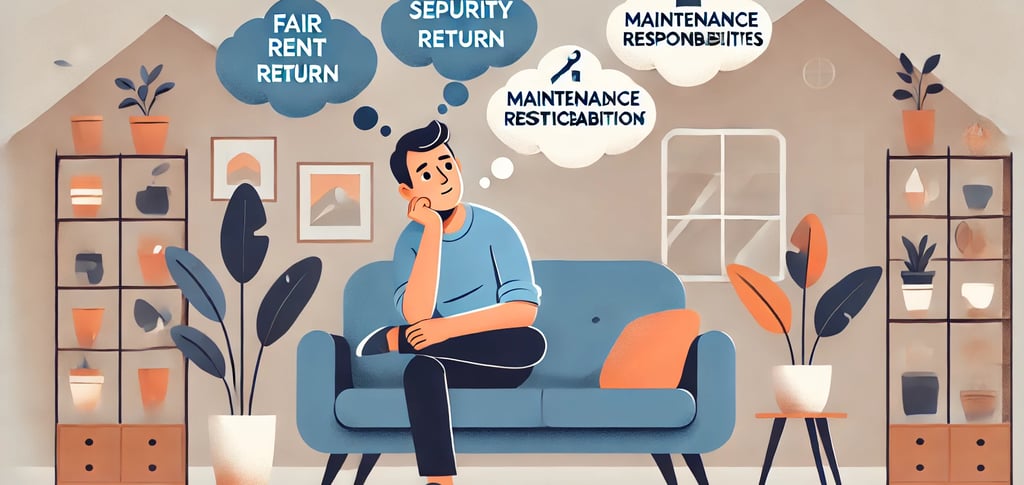Understanding Tenant Rights in India
Know your rights as a tenant in India! This article explains essential tenant rights, including protection against unfair eviction, right to privacy, and fair rent practices. Ensure a smooth and legally sound tenancy.
2/6/20253 min read


Renting a property is a common practice, and both landlords and tenants have certain rights and responsibilities. A tenant is an individual or entity who rents a property (residential or commercial) from a landlord for a specific period, typically under a lease or rental agreement. Understanding tenant rights is crucial for a smooth and legally sound tenancy. While specific laws can vary by state in India, this article provides a general overview of tenant rights, touching upon expected trends in 2025 and beyond.
Key Tenant Rights in India:
While laws are subject to change, several core tenant rights remain generally consistent across India:
Right to Habitable Premises: Landlords are obligated to provide and maintain safe and habitable living conditions. This includes essential services like water, electricity, sanitation, and a structurally sound building. If the landlord fails to provide these, the tenant may have grounds to break the lease or withhold rent (after proper notice and following legal procedures).
Example: If the roof starts leaking and the landlord doesn't repair it after repeated requests, the tenant might have the right to take legal action.
Protection Against Unfair Eviction: Tenants have protection against arbitrary eviction. Landlords cannot evict tenants without a valid reason and without following due process of law. They generally must provide proper notice as per the rental agreement or applicable laws. Forcible eviction is illegal.
Example: A landlord cannot simply ask a tenant to leave without notice because they found a new tenant willing to pay more.
Right to Privacy: Landlords cannot intrude on a tenant's privacy without reasonable notice or consent, except in emergencies. Frequent and unwarranted visits are considered harassment.
Example: A landlord cannot enter the rented premises without informing the tenant beforehand, except in cases of emergency like a fire.
Right to Fair Rent: Rent control laws exist in some states to prevent landlords from charging exorbitant rent. While these laws are evolving and often favor market-driven rents, tenants still have the right to fair and reasonable rent increases, usually with proper notice and within legal limits.
Example: Even if rent control isn't in place, landlords usually can't increase rent drastically without giving the tenant sufficient notice.
Right to Receipts: Tenants have the right to receive rent receipts for payments made. This serves as proof of payment and protects them from disputes regarding rent payment.
Security Deposit: Landlords commonly take security deposits. The law often restricts the amount that can be collected as a security deposit (usually a maximum of 2-3 months' rent). The deposit should be returned to the tenant at the end of the tenancy, after deducting any legitimate dues for damages (beyond normal wear and tear) or unpaid rent.
Example: The landlord cannot withhold the entire security deposit for minor wear and tear, like faded paint.
Right to Basic Amenities: Tenants are entitled to basic amenities as agreed upon in the rental agreement, such as access to parking, elevators, and common areas.
Tenant Rights in 2025 and Beyond (Anticipated Trends):
Increased Digitization: Expect more digital processes for rent payments, agreements, and communication between landlords and tenants. This will likely improve transparency and efficiency.
Model Tenancy Act Implementation: The Model Tenancy Act, 2021, although advisory, is influencing state-level rental laws. It aims to standardize landlord-tenant relations and is expected to be adopted more widely, offering greater clarity on rights and responsibilities. Look for increased focus on written agreements, clear dispute resolution mechanisms, and defined timelines.
Greater Protection for Tenants: While the trend leans towards balancing the rights of both landlords and tenants, increased awareness of tenant rights and advocacy efforts may lead to stronger protections against unfair practices.
Focus on Habitability: Expect stricter enforcement of habitability standards, with greater emphasis on landlords' responsibility to provide safe and well-maintained premises.
Important Considerations:
State Laws: Rental laws are primarily state-specific. Always consult the relevant laws of your state for accurate and up-to-date information.
Rental Agreement: A well-drafted rental agreement is crucial. It should clearly state the terms and conditions of the tenancy, including rent, duration, security deposit, and responsibilities of both parties.
Legal Advice: If you face any issues with your landlord or have questions about your rights, seek legal advice from a lawyer specializing in property law.
Conclusion:
Understanding tenant rights is essential for a positive renting experience. By being aware of your rights and responsibilities, you can ensure a smooth and legally compliant tenancy. Keep yourself updated on evolving laws and best practices to protect your interests as a tenant. The anticipated trends suggest a move towards greater clarity, digitization, and balanced rights for both landlords and tenants in the coming years.
Bengaluru Housing
Explore Bengaluru's housing market through insightful articles.
subscribe us
© 2025. All rights reserved.
